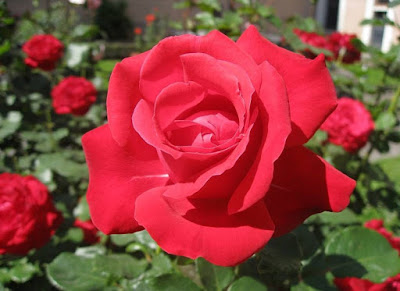Rose Flowers - Roses are herbaceous herbaceous plants with barbed stems.
Rose is known as a symbol or symbol of religious life in human civilization.
Roses come from the plains of China, the Middle East, and Eastern Europe.
In its development, these decorative rose plants spread in
cold and hot climates. Roses is one of the plants that belong to the family
Rosaceae. Generally, species of roses are thorny and creeping bushes, the
height can reach 2-5 meters.
Actually, roses are not tropical plants. Most of the species
of roses that grow in Southeast Asia thicken all the leaves, so only a few
species can always be green leafy during the year.
Typically, the colors of roses are white, pink, yellow, and
red. Usually, roses have sharp little spines on the stems. However, some types
of roses have undeveloped thorns and are not sharp.
19 Nutrition of Rose Flowers
In addition to the beauty and fragrance, it turns out the
rose plants menagndung many substances that are very useful.
There are some groups that utilize roses as beauty nurses.
Because, in the rose there is a vitamin C content useful to increase the
production of collagen that serves to maintain skin elasticity and moisture.
However, there are still many Indonesian people who do not
know the efficacy and content of roses.
In addition to having vitamin C, there are many other
content contained in roses. Inside the roses are at least contained:
- Phenethyl alcohol prevents or inhibits bacterial growth, and thus protects cosmetics and personal care products from rapid decomposition. Phenylethy Alcohol also gives a fragrance to the product.
- Farnesol acts as an anti-fungal and anti-bacterial that can suppress the development of microorganisms on the skin. Usually used as an ingredient of beauty products.
- Flavonoids can act as antioxidants and function to neutralize free radicals and thus minimize the effects of damage to cells and tissues.
- Vitamin B. Vitamin B is 8 vitamins that dissolve in water and plays an important role in cell metabolism in living things.
- The important role of carotenoids as an antioxidant agent and in photosynthesis systems. In addition, carotenoids can also be converted into essential vitamins.
- Pectin is used in the treatment of diarrhea, usually in combination with other adsorbents. Attapulgite and pectin are claimed to adsorb toxins, gases, bacteria, and viruses found in the intestinal lumen.
- Vitamin E. Vitamin E is an important substance that can support the performance of organs. This substance also has an antioxidant effect that can protect the body's cells from damage.
- Polyphenols play a role to protect body cells from free radical damage by binding to free radicals that prevent inflammation and inflammation of cells.
- Stearopten is also commonly used in beauty products to create a scent.
- Terpena and terpenoids make up a lot of essential oils produced by plants. Essential oil content affects the use of spice products, both as a spice, as a perfume, as well as medicinal, health, and ritual ceremonial ingredients.
- Geraniol has many benefits in the field of cosmetics, animal husbandry and health. This substance is also widely used in anti mosquito products.
- Eugenol is used in perfumes, flavorings, essential oils and in medications as an antiseptic and local anesthetic. Eugenol is a key ingredient in Indonesian clove cigarettes (cloves).
- Vitamin C. Vitamin C is one type of vitamin that is water soluble and has an important role in warding off various diseases and strengthen the immune system.
- Grimic acid. Geranic acid one of the acid content commonly used in addition to beauty produ. In addition to roses, geranik acid is found in lemongrass.
- Vitamin K. This vitamin can prevent dibaetes and help metabolism in the body associated with the resistance of insulin compounds. In the body, vitamin K can also suppress the bleeding process in the liver.
- Nerol is an alcohol having a double bond and a free electron pair. In addition, nerol has a fragrant odor so commonly used as an oil odor therapy material.
- Most vanillin is used as a flavor enhancer, usually in sweet foods. In addition, Vanillin is also used in the perfume industry (perfume) and to mask the odor or taste in medicines, cleaning products and animal feed.
- Tannin. Tanin substances can precipitate proteins to be used as an antiseptic
Other Rose Flowers Benefits
With the amount of content contained in roses, the roses can
be used as raw materials of drugs, such as aromatherapy, menstrual surge, cure
infection, cure bile secretion, reduce body heat, antiseptic, eliminate
leucorrhea, increase endurance, and treat poisonous insect bites.
According Izky (2009), in the rose plants there antosian
which is one of natural dyes and soluble in water. This dye is widely used as a
processed material, good for food and beverages.
Antosians will be more stable in acidic conditions than
under alkaline or neutral conditions. Antosians include flavonoid compounds
that have a function as natural antioxidants. In addition, anthocyanin can also
stop the reaction and free radicals.
The absence of harmful elements make roses safe enough to be
used as a medium of beauty and health.
In Thailand, roses are often processed into part of the
mainstay food menu in some restaurants. To add aroama drinks, leaves and rose
petals that have been dried can be used as tea.
So little discussion of the 18 Benefits of Rose Flower for Human hopefully with this restriction can add insight and knowledge to all of
us, thank you very much for visiting.
Read also other articles:
- Tips to Plant Ornamental Flowers Lily of the Valley in your Home
- How to Plant and Take Care Bougainvillea Flowers
- How to Easily Plant and Take Care Ashoka Flowers
- All About Ornamental Gloriosa Flowers

